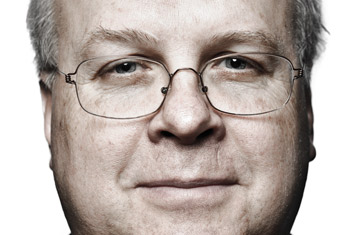
Karl Rove photographed Febuary 10th, 2010, as part of the World Affairs Council of Oregon's International Speaker Series, Portland, Oregon.
(6 of 7)
Obama's campaign has so far outspent Romney's. But the combined firepower of the Weaver Terrace network has given Rove's "good guys" an overall cash advantage.
The Hole-in-the-Wall Gang
Rove is best known as a strategist, but he has recently become a deft fundraiser as well. Law recalls one meeting at a West Coast restaurant early last year at which a donor told Rove he was happy to fund efforts to win back the Senate but didn't want to waste money taking on a President who, at that time, was polling well. At that, Rove sprang into data mode, scribbling a flurry of numbers on the table's white paper covering, including the poll numbers of past Presidents at an equivalent point in their first term, to show that Obama was eminently beatable. When he finished, Rove tore off the section of the paper bearing his handiwork and handed it to the duly impressed donor.
Many of the big contributors funding Rove's new political network are Texans he's known for decades--including the Houston homebuilder Bob Perry, a major Swift Boat Veterans for Truth backer, and the Dallas metals-and-chemicals executive Harold Simmons, who calls Obama a socialist. Together, Perry and Simmons have given more than $15 million to American Crossroads.
Rove wins over donors in part by pitching Crossroads as a professionalized contrast to fly-by-night political groups notorious for overhead costs and fee-skimming consultants. (Rove takes no Crossroads salary and pays his own expenses, as is the case with former Mississippi governor and GOP rainmaker Haley Barbour, another Crossroads adviser-fundraiser.) "It used to be that at the end of the day, a donor would get a return of 60 to 70 cents on the dollar," says Crossroads spokesman Jonathan Collegio, adding that the group's fundraising and overhead run about 1% to 2% respectively. "It's not driven up by fancy offices and leather furniture." Collegio points to a wall where wires still hang loose from a spot where a TV had once been mounted. "I mean, look--that hole's been in the wall since I started."
Thinking Big and Small
After sitting for an interview in his office, Rove needs to dash to Capitol Hill to meet with some Republican members of Congress. ("Don't ask me what it's about," he says with a grin.) He hops into a taxi, and before long, he's opining about the election. Grand ideology isn't his style, and he is soon arguing that it is likely to hinge on relatively minor fluctuations among demographic groups like college-educated women, white working-class voters and African Americans. He cites from memory Obama's winning vote margin in North Carolina four years ago (14,000) and notes that for the President, "if African-American turnout dips even a small amount, you're gone." But Rove also likes to think big. A reading list on his website features titles about Socrates, Cleopatra and--of course--Machiavelli. He likes classics too. "Best to read this to yourself out loud," he says of Paradise Lost. "That way, you get Milton's rhythm and meaning better."
